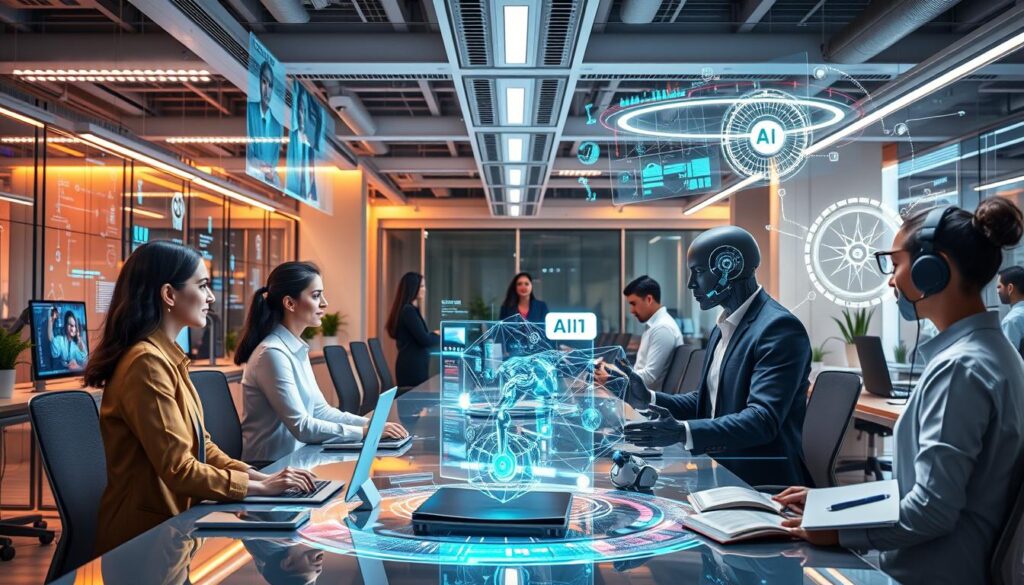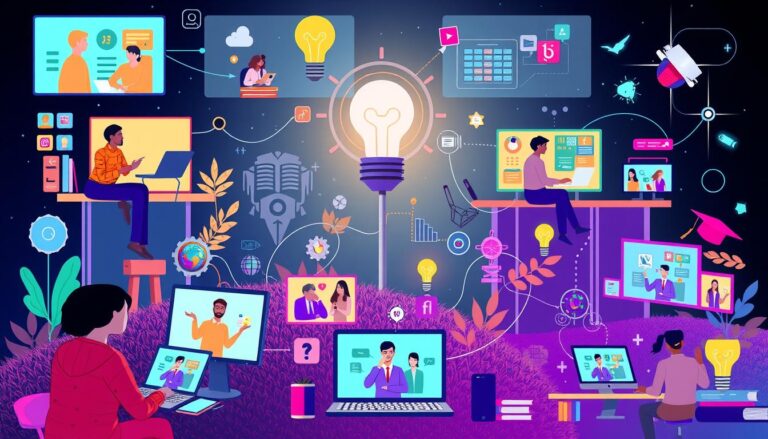How Artificial Intelligence Can Transform Your Business
Artificial intelligence is changing the business world fast. Almost 80,000 companies are working on AI. This opens up big chances for growth and new ideas in your business.
Machine learning and AI are now key for staying ahead. McKinsey & Co. says more companies are using AI, up from 50% to 72% in a year. Most business leaders think AI will shake up their fields, making it crucial to use AI wisely.
Using generative AI, workers can be 40-50% more productive. Big names like Amazon and Netflix show how AI can make things better. It can make processes smoother, offer personalized services, and help make smart choices.
Table of Contents
Understanding the Fundamentals of AI in Business Operations
Artificial intelligence is changing the game for businesses in many fields. Your company can use AI to improve operations and spark new ideas.

More and more businesses are using AI to stay ahead. AI technologies offer tools that can change how you tackle tough business problems.
Types of AI Technology for Business
AI includes several key areas that can boost your business:
- Machine learning for predictive analytics
- Deep learning neural networks for complex pattern recognition
- Natural language processing for advanced communication systems
- Intelligent automation solutions
Key Components of Business AI Systems
To make AI work, you need to know the basics:
- Robust data collection infrastructure
- Advanced algorithm selection
- Continuous model training
- Performance monitoring systems
The Role of Machine Learning in Modern Business
Machine learning is key for businesses wanting to make smart decisions. It looks at big data to find patterns, predict trends, and help make big choices.
“AI is not just a technology, it’s a strategic imperative for businesses looking to stay competitive in the digital age.”
Neural networks and deep learning help businesses process info fast and accurately. They change how we solve problems and come up with new ideas.
The Current State of Artificial Intelligence in Business

The world of AI is changing fast. Companies from many fields are using generative AI. Surveys show a big change in how businesses use AI.
Here are some important points about AI in business today:
- 65% of organizations now regularly use generative AI
- 50% have implemented AI in two or more business functions
- 67% plan to increase AI investments in the next three years
AI is changing how businesses use data. Industries like energy, materials, and professional services are leading. Some companies are seeing big financial gains thanks to AI.
“AI is not just a technology trend, it’s a fundamental business transformation tool.” – AI Innovation Research Group
Different sectors use AI in their own ways:
- Healthcare: Medical diagnosis and treatment planning
- Retail: Inventory management and consumer experience optimization
- Finance: Personalized services and operational automation
- Transportation: Route optimization and efficiency improvements
While AI is exciting, businesses face challenges. 44% of organizations have encountered negative consequences, with data accuracy being the primary concern. Success comes from careful planning, tailored models, and smart integration.
How AI Drives Business Efficiency and Productivity
Artificial intelligence is changing how businesses work. It brings new levels of automation and workflow optimization. This change lets companies rethink productivity and see big improvements in performance.
Businesses are seeing big wins with AI. Salesforce says 84% of companies using AI see a big boost in efficiency.
Automating Routine Tasks
AI helps businesses automate boring and time-wasting tasks. This frees up people to focus on important work. The main benefits are:
- Less manual data entry
- Smarter scheduling and admin work
- Less chance of mistakes in routine tasks
Workflow Optimization Strategies
AI tools are making workflow management better across many industries. Companies can use AI to:
- Check how things are done now
- Find and fix slow spots
- Make smart changes based on data
Cost Reduction Through AI Implementation
McKinsey says AI can cut costs by up to 22%. Using AI wisely helps businesses save money in many ways. For example:
| Cost Reduction Area | Potential Savings |
|---|---|
| Labor Optimization | 15-20% |
| Inventory Management | 20-30% |
| Error Reduction | Up to 67% |
“AI is not about replacing humans, but enhancing human potential and productivity.” – Tech Innovation Expert
By using AI, your business can become more efficient, cut costs, and stay ahead of the competition.
Transforming Customer Experience with AI Solutions
AI is changing how businesses talk to customers, making experiences more personal. With advanced tools, companies can offer service that was unthinkable a few years ago.
AI chatbots are changing customer support. They can:
- Handle many customer questions at once
- Offer support 24/7
- Save on costs
- Make waiting times shorter
“AI transforms customer interactions from transactional to deeply personalized experiences” – Tech Innovation Review
Now, personalized experiences are a must, not just nice to have. AI uses customer data to make recommendations and content that fit each person’s taste.
| AI Customer Experience Metric | Traditional Model | AI-Powered Model |
|---|---|---|
| Query Response Time | Minutes to Hours | Seconds |
| Personalization Level | Generic | Highly Customized |
| Operational Efficiency | Limited | Maximum |
By using AI in customer service, businesses can make interactions smooth and smart. This builds loyalty and gives them an edge over competitors.
AI-Powered Data Analytics and Decision Making
In today’s digital world, data is more valuable than ever. Every day, over 2.5 quintillion bytes of data are created. This gives businesses a huge chance to use big data analysis and business intelligence with AI.
AI changes how we handle and understand complex data. With 97.2% of companies using AI analytics, they’re finding insights they couldn’t before.
Big Data Processing Capabilities
Artificial intelligence makes data processing faster and better. AI platforms can:
- Analyze huge amounts of data in seconds
- Find complex patterns and connections
- Reduce manual data work by up to 80%
- Make data more accurate and precise
Predictive Analytics and Forecasting
AI-powered predictive analytics gives businesses a big edge. By looking at past data and current trends, companies can:
- Make more accurate market forecasts
- Understand what customers will do next
- Spot risks before they happen
- Manage inventory better
Real-time Business Intelligence
Real-time business intelligence changes how we make decisions. AI lets us analyze data instantly. This means businesses can:
| Industry | AI Analytics Impact |
|---|---|
| Financial Services | Get market trend insights right away |
| Healthcare | Keep an eye on patients all the time |
| Retail | Change prices and inventory fast |
| Manufacturing | Know when to fix equipment |
“AI-driven analytics give companies the speed to make smart decisions in real-time. It turns data into a key advantage.” – Tech Innovation Quarterly
By using AI for data analytics, your business can discover new insights. It can drive innovation and stay ahead in a world where data is everything.
Enhancing Business Security and Risk Management
Artificial intelligence has changed how businesses handle cybersecurity and risk management. Now, you can use advanced AI to fight off digital threats and lower risks.
AI is making risk assessment better by giving deep insights and strong protection. Companies can spot and stop security breaches with great accuracy.
Key AI Security Capabilities
- Advanced fraud detection through pattern recognition
- Real-time cybersecurity threat monitoring
- Automated risk identification and mitigation
- Predictive threat analysis
Using AI in risk management brings big benefits. Machine learning algorithms can process huge amounts of data to find security risks fast.
“AI is not just a tool, but a strategic partner in protecting your business from emerging digital risks.” – Cybersecurity Expert
Financial institutions have seen a lot of good from AI in fraud detection. These smart systems check transaction patterns to spot suspicious activities that might be fraud.
| Risk Management Area | AI Contribution |
|---|---|
| Cybersecurity | Real-time threat detection |
| Fraud Prevention | Anomaly identification |
| Compliance | Automated verification |
| Risk Assessment | Predictive analytics |
Adding AI to your risk management plan can greatly cut down on financial losses and protect your company’s image. This tech lets you find threats before they happen, keeping you ahead of security issues.
AI Integration in Marketing and Sales Strategies
Artificial intelligence is changing how businesses market and sell. AI tools are giving new insights and personalization. This boosts customer engagement and revenue.
Today, businesses use AI for smarter marketing. AI helps predict what customers will do next. It makes sales better by improving how we talk to customers and sell to them.
Personalized Marketing Campaigns
AI lets businesses make marketing that really speaks to people. It looks at lots of data to:
- Recommend content that fits what customers like
- Guess what customers might want
- Make marketing messages that change as needed
- Find the best ways to reach customers
Sales Prediction and Optimization
AI in sales is a big win. Companies using AI for lead scoring see a 50% increase in qualified leads. AI looks at customer data to:
- Find the best customers to talk to
- See what sales trends are coming
- Help with lead nurturing
- Make sales teams work better
Customer Behavior Analysis
“AI turns data into useful insights, helping businesses know and meet customer needs better than ever.”
Using advanced analytics, businesses can cut costs by up to 40% and boost sales. AI uncovers how customers interact, giving a big advantage in the market.
Revolutionizing Supply Chain and Inventory Management
Artificial intelligence is changing how companies manage their supply chains and inventory. Already, 62% of businesses use AI in their supply chain operations. This has led to big improvements in efficiency and better decision-making.
“AI is not just a technology; it’s a strategic tool that revolutionizes how we manage complex supply chain networks.”
Your business can see huge benefits from AI in forecasting inventory and predicting demand. These tools use lots of data to make smart plans:
- Real-time inventory tracking
- Predictive demand analysis
- Automated risk assessment
- Optimized logistics planning
AI helps businesses change how they manage their supply chains. It gives smart insights. With AI, companies can guess market trends, keep the right amount of stock, and save money.
| AI Supply Chain Capability | Business Impact |
|---|---|
| Demand Prediction | Reduce stockouts by 50% |
| Route Optimization | Cut transportation costs by 25% |
| Inventory Management | Improve resource allocation efficiency |
By using AI, you can make your supply chain more flexible and quick to adapt. It can handle changes in the market and what customers want.
AI Implementation Strategies for Business Growth
Digital transformation with AI is key for businesses to stay ahead. As companies explore AI, a clear plan is crucial for success. It’s the difference between achieving goals and missing out.
Adopting AI well needs careful planning and smart action. Companies must create a detailed plan. This plan should tackle tech, culture, and operational hurdles.
Steps to AI Adoption
- Conduct a comprehensive data audit
- Identify specific business needs and potential AI applications
- Assess current technological infrastructure
- Select appropriate AI technologies
- Develop a phased implementation strategy
Overcoming Implementation Challenges
Integrating AI can face many hurdles. Key challenges include:
- Data quality and accessibility
- Cultural resistance to technological change
- Skills and talent gaps
- Integration with existing systems
“AI implementation is not just a technological upgrade, but a strategic transformation of business processes.” – Harvard Business School Researchers
Measuring AI ROI
Measuring AI’s return on investment needs a detailed method. Businesses should track key performance indicators. These should show clear value.
| KPI Category | Specific Metrics | Impact Assessment |
|---|---|---|
| Operational Efficiency | Mean Time to Repair (MTTR) | Reduction in system downtime |
| Predictive Accuracy | Mean Absolute Error (MAE) | Improvement in forecasting |
| Customer Experience | First Contact Resolution Rate | Enhanced customer satisfaction |
Frost & Sullivan’s Global State of AI research shows 87% of firms see AI’s value. It can boost revenue, efficiency, and customer satisfaction. With a smart AI strategy, businesses can grow and thrive.
Future Trends in AI Business Applications
The world of artificial intelligence is changing fast. By 2024, the AI market is expected to hit 306 billion USD. This is a 27% jump from last year.
Cognitive computing is changing many industries. Companies are using advanced AI to understand complex data better. They’re also combining AI with augmented reality for new, immersive experiences.
“AI is not just a technology; it’s a strategic business revolution.” – Tech Innovation Experts
Here are some key AI trends for businesses:
- Advanced cognitive computing systems
- Personalized AI assistants
- Immersive augmented reality experiences
- Internet of Things (IoT) integration
AI’s impact will be huge. By 2030, it could add 15.7 trillion USD to the global economy. This is more than what China and India will contribute together.
| AI Trend | Market Projection | Expected Impact |
|---|---|---|
| Digital Voice Assistants | 8.4 billion devices by 2024 | Enhanced user interaction |
| Small Language Models | Over 31,000 8B models | Efficient resource utilization |
| Healthcare Chatbots | $431.47 million by 2028 | Improved patient services |
As businesses dive into AI, the future looks bright. We’ll see smarter, more adaptable, and personalized tech. It will change how we work and interact.
Competitive Advantages of AI Integration
In today’s fast-paced business world, getting ahead means using AI. Companies that use artificial intelligence are changing how they work. They are growing their businesses in new ways.
AI gives businesses big advantages. It helps them stand out from others. By using new tech, companies can find deep insights and make processes smoother.
“86% of CEOs believe AI will become mainstream technology within five years” – PwC Survey, 2021
- Enhanced decision-making capabilities
- Increased operational efficiency
- Advanced data processing and analysis
- Personalized customer experiences
AI is changing the game in many industries:
| Company | AI Implementation | Results |
|---|---|---|
| Bella Sante | AI-powered Customer Service Chatbot | 75% of customer calls handled automatically |
| Forvia | AI Recruiting System | 3.5x increase in website applicants |
| Danone Group | AI Analytics for Demand Planning | 20% reduced forecasting errors |
Using AI smartly can make your business much more productive. McKinsey found that 30% of tasks in 60% of jobs can be automated. This opens up huge chances for innovation and better work.
The business world is changing fast, and AI is key to keeping up. Companies that invest in AI will lead their fields.
Conclusion
The business world is changing fast with AI. You’re seeing a big shift where artificial intelligence is changing how companies work and compete. AI brings new chances to make things better and find new ways to do things.
Your business plan needs to include smart tech that can understand big data and predict what’s next. The future of AI in business is about making systems that can change quickly with the market. Companies that get this right will have a big edge over others.
But, using AI right is key. It’s not just about using new tech; it’s about doing it in a way that’s fair and keeps people involved. AI should help people, not replace them. The best companies will mix new tech with human ideas and planning.
As AI keeps getting better, your ability to use it will decide your business’s future. Start using AI now, keep learning, and lead in tech innovation.







